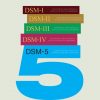DSM 5 AS A DYSTOPIAN NOVEL
Book of Lamentations
… The narrative voice of the book affects a tone of clinical detachment, one in which drinking coffee and paranoid-type schizophrenia can be discussed with the same flat tone. Under the pretense of dispassion this voice embodies a whole raft of terrifying preconceptions. Just like the neurological disorders that appear at the start of the book, mental illnesses appear like lightning bolts, with all their aura of divine randomness. Even when etiologies are mentioned they’re invariably held to be either genetic or refer to other illnesses such as substance abuse disorders. At no point is there any sense that madness might be socially informed, that the forms it takes might be a reflection of the influences and pressures of the world that surrounds us.
The idea emerges that every person’s illness is somehow their own fault, that it comes from nowhere but themselves: their genes, their addictions, and their inherent human insufficiency. We enter a strange shadow-world where for someone to engage in prostitution isn’t the result of intersecting environmental factors (gender relations, economic class, family and social relationships) but a symptom of “conduct disorder,” along with “lying, truancy, [and] running away.” A mad person is like a faulty machine. The pseudo-objective gaze only sees what they do, rather than what they think or how they feel. A person who shits on the kitchen floor because it gives them erotic pleasure and a person who shits on the kitchen floor to ward off the demons living in the cupboard are both shunted into the diagnostic category of encopresis. It’s not just that their thought-process don’t matter, it’s as if they don’t exist. The human being is a web of flesh spun over a void.
full article here
Thanks to Mad in America
